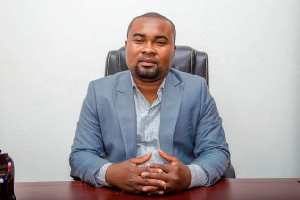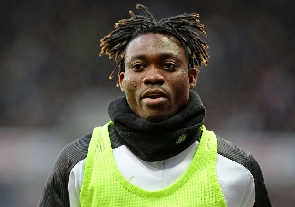


Attractive News Blog of Sunday, 24 November 2024
Source: Andre Mustapha NII okai Inusah
Despite Challenges, Facts and Data Still Prove that NPP is Better Managers of the Economy than NDC: Dr. Razak Kojo Opoku

Sincerely speaking, Ghanaians experienced some significant level of economic difficulties especially during the Post Covid-19 economic recovery periods of 2021, 2022 and 2023, exacerbated by global supply chain disruptions caused by the geopolitical tensions/war between Russia and Ukraine.
Before the war, Ukraine and Russia were major suppliers of wheat, fertilizers, and fuel to many African countries including Ghana.
Despite the aforementioned challenges, the facts and data on Ghana's economy show that the New Patriotic Party(NPP) and its roots, UP Tradition still come across as the Party with the best track records when it comes to the prudent management of the economy of Ghana.
This includes;
*Ghana's Inflation Rates Statistics between NPP and NDC*
According to facts and data, the worst yearly inflation rates of Ghana were recorded under the governments of NDC, and Hilla Limann's government(54.44% in 1979, 50.04% in 1980 and 116.50% in 1981).
Ghana's worst yearly Inflation Rates recorded under the PNDC/NDC governments are as follows:
122.87% in 1983
39.6% in 1984
24.57% in 1986
39.82% in 1987
31.36% in 1988
25.22% in 1989
37.26% in 1990
24.96% in 1993
24.87% in 1994
59.46% in 1995
46.56% in 1996
27.89% in 1997
14.62% in 1998
40.24% in 2000
19.25% in 2009
15.49% in 2014
17.15% in 2015
17.45% in 2016.
However, Ghana's worst yearly inflation rates recorded under NPP governments are as follows:
41.51% in 2001
29.77% in 2003
18.04% in 2004
15.44% in 2005
16.49% in 2008
31.71% in 2022
37.53% in 2023
I want to state authoritatively that, the New Patriotic Party has NEVER recorded a yearly inflation rate of 54.1%.
The 54.1% recorded under Akufo-Addo's government was a monthly inflation rate of December 2022, however, the yearly inflation rate for 2022 was 31.71%.
In terms of excellent inflation rates track records of Ghana, the UP Tradition which has produced Busia's government, Kufuor's government and Akufo-Addo's government possess the best track record for Ghana.
Best Inflation Rates under Busia government are as follows:
7.32% in 1969
3.03% in 1970
9.56% in 1971
10.07% in 1972
So far, absolutely no government in Ghana's history has been able to beat the inflation rates track record of Busia's government.
Best Inflation Rates under Kufour's government are as follows:
9.36% in 2002
11.68% in 2006
10.73% in 2007
Best Inflation Rates under Akufo-Addo's government are as follows:
12.37% in 2017
7.81%.in 2018
7.14% in 2019
9.89% in 2020
9.99% in 2021
Moving to the governments of NDC, the Best Inflation Rates under Rawlings government are as follows:
10.31% in 1985
4.87% in 1999
10.06% in 1992
Best Inflation Rates under Mills' government are as follows:
10.73% in 2010
8.73% in 2011
11.19% in 2012
Best Inflation Rates under Mahama's government are as follows:
11.67% in 2013
15.49% in 2014
17.15% in 2015
17.45% in 2016
It is important to state that, there was NO Covid-19 pandemic and global supply chain disruptions under Mahama's government, and Mills' government.
Historically, on the average, the New Patriotic Party(NPP) has excellent inflation rate track records than the NDC based on Facts and Data.
*Why Akufo-Addo Recorded a Monthly Inflation Rate of 54.1% in December 2022*
The monthly inflation rate of 54.1% recorded in December 2022, and yearly inflation rates of 31.71%, and 37.53% respectively recorded in 2022 and 2023 were predominantly influenced by unforseen external factors beyond the control of the government.
The Russia-Ukraine War severely disrupted the global supply chains, fuelling a devastating surge in the prices of food(wheat), fuel, Iron rods, fertilizers and other materials.
In Ghana, Kenya and Egypt, for example, Russian and Ukraine wheat once accounted for as much as 80%, 85%, and 67% of imports respectively.
Furthermore, the impact of the Russia-Ukraine War comes at a time when Ghana, Africa and the world at large were still reeling from the economic setbacks caused by the global COVID-19 pandemic, adding about 18-25 million people to the already estimated 546 million Africans living in poverty.
*Management of Ghana's Debts to GDP Analysis*
John Mahama has accused Akufo-Addo's government of increasing the national debts of Ghana to 767 Billion Ghana Cedis at the exchange rate of 16.02ghc to $1, giving us $47.88 Billion debts in terms of dollars.
However, John Mahama has forgotten to acknowledge the fact that, the worth or total size of Ghana's economy(GDP) has grew to $76.37 Billion under Akufo-Addo's government, far better than the $56.16 Billion that Akufo-Addo Inherited from John Mahama in 2016.
Under John Mahama, the GDP of Ghana was $56.16 Billion at a population of 29.55 million Ghanaians. Dividing the $56.16 Billion by the population of 29.55 million, every Ghanaian was worth $1,900 at exchange rate of 3.95ghc to $1 which is equal to 7,505ghc.
What this means is that, if Ghana was to be sold to an Investor in 2016 under John Mahama, every Ghanaian would have received a total amount of $1,900 or 7,505ghc.
Fast forward to the government of Akufo-Addo, the GDP of Ghana has grown to $76.37 Billion at a population of 34.78 million Ghanaians. Dividing the $76.37 Billion by the population of 34.78 million, every Ghanaian is now worth $2, 200 at an exchange rate of 16.02ghc which is equal to 35, 244ghc.
What this means is that, if we are selling Ghana under Akufo-Addo’s government to an investor, every Ghanaian would receive a total amount of $2, 200 or 35,244ghc.
Therefore, despite economic challenges, Akufo-Addo's government is still better than the government of John Mahama in terms of GDP growth in relation to the population growth of Ghana.
*Ghana's Relations with the IMF*
Also, the opponents of NPP have ridiculed Akufo-Addo's government for securing bailout from the IMF.
However, the facts and data prove that the New Patriotic Party is NOT reckless when it comes to securing support from the IMF. Per the records, PNDC/NDC has been to the IMF for bailout 10 Times as compared to the NPP which has been to the IMF 2 Times.
NDC Bailouts From the IMF are as follows:
3rd August 1983
27th August 1984
15th October 1986
November, 1987(for Structural Adjustment Facility Commitment)
6th November, 1987(for Extended Fund Facility)
9th November 1988
30th June 1995
3rd May 1999
15th July 2009
3rd April 2015
NPP Bailouts from the IMF are as follows:
9th May 2003
26th September 2022
Kufuor went to the IMF as a HIPC Country for a debt relief, and this initiative reduces Ghana's debt from $66 Billion to $23 Billion after the IMF programme.
Akufo-Addo government went to the IMF for balance payments support largely due to Post COVID-19 economic recovery and the Russia-Ukraine War.
*Would Bawumia's Government Be Different from Akufo-Addo & Mahama's Government?*
Most definitely, the government of Dr. Mahamudu Bawumia would perform far better than the governments of Akufo-Addo and John Mahama.
The policy propositions of Dr. Mahamudu Bawumia are superior to the policies initiated and implemented by the governments of Akufo-Addo and John Mahama.
Also, the government of Dr. Mahamudu Bawumia would review the Foreign Exchange Act 723 in order to better manage and control the depreciation of the Cedi against the dollar and other major trading currencies.
Akufo-Addo's government introduced E-levy but the government of Bawumia shall cancel E-levy.
Many have argued why not now? The answer is enshrined in Articles 174, 175, 176, 177, 178, 179, 180, 181, 182, 183, and 184 of the 1992 Constitution of the Republic of Ghana whereby a Vice-President has NO Authority and Power to effect changes in policies even if he disagree with his President.
Mills' government managed the economy with Dr. Kwabena Duffuor as a Minister of Finance, and Amissah-Arthur as a Governor of Bank of Ghana.
However, the government of John Mahama managed the economy with Seth Terkper as a Minister of Finance, Dr. Henry Kofi Wampah as a Governor of the Bank of Ghana, subsequently replaced by Dr. Abdul-Nashiru Issahaku. The same NDC with different governments with different people managing the respective Fiscal Policy and Monetary Policy.
The two critical people to the economic success of every government are the Minister of Finance(responsible for the management of Fiscal Policy), and Governor of the Bank of Ghana(responsible for the management of Monetary Policy).
Therefore, the government of Dr. Mahamudu Bawumia shall definitely appoint different people to manage the Fiscal Policy and Monetary Policy of Ghana when elected as the President of the Republic of Ghana on 7th December, 2024.
Entertainment
















